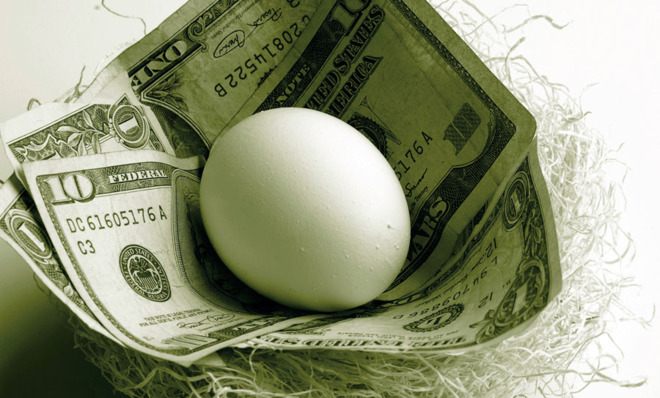3 retirees reveal their nest egg mistakes
Don't repeat these misguided retirement strategies

A free daily email with the biggest news stories of the day – and the best features from TheWeek.com
You are now subscribed
Your newsletter sign-up was successful

At some point in our adult lives, most of us make a big financial mistake … or two or three.
For me, it was spending too much money on eating out, buying clothes, and taking vacations — ultimately swiping my credit card to the tune of about $4,000.
As a result, I spent the majority of my 20s crawling out of the hole I'd dug myself into as a student, and therefore didn't really start saving — or learning to truly live within my means, for that matter — until my early 30s.
The Week
Escape your echo chamber. Get the facts behind the news, plus analysis from multiple perspectives.

Sign up for The Week's Free Newsletters
From our morning news briefing to a weekly Good News Newsletter, get the best of The Week delivered directly to your inbox.
From our morning news briefing to a weekly Good News Newsletter, get the best of The Week delivered directly to your inbox.
When I retire, I'll no doubt regret the thousands I could have contributed to my nest egg had I only stuck to the not-so-terrible dining hall food, as well as simply waited to travel and buy clothes when I could afford them.
Yet I'm comforted by the fact that there's still time for me to get back on track for retirement — and the same may be true for you, too, if you're recovering from a financial blunder of your own.
And even if you're not, making mistakes isn't the only way to learn a valuable money lesson or two. That's why we asked three real retirees to confess how financial errors made long ago have affected their nest eggs today — in the hope that their stories of misguided retirement strategies can help you strengthen your own.
My nest egg mistake: "I neglected to invest in my 20s."
A free daily email with the biggest news stories of the day – and the best features from TheWeek.com
Rea Hunter, 72, a Saddle River, N.J., teacher who retired this year, got a financial wake-up call in her 20s when her father passed away at just 53.
"My mother was not working, and she didn't have immediate access to their joint bank accounts. As a result, I had to help by paying some of her bills, such as utilities, until she could get access to that money," Hunter says.
After watching her mother struggle until her father's will was probated, Hunter vowed to always protect her own financial security — which meant keeping one separate bank account from her husband.
And while she's stayed committed to this principle ever since, Hunter says she regrets not taking her financial independence one step further. "I wish I had learned how to navigate the stock market in my 20s in order to have made some good investments," she says.
Another regret? The fact that she never sought out help to better understand her investment options prior to getting married, aside from the annuity she invested in through the New Jersey school system.
"If I had chosen the right stocks in my 20s, I could be living off those dividends by now," she says. "And then I could have put the money from my teaching salary toward real estate investments, more travel, and many more charitable contributions."
An adviser weighs in: Investing skills don't come naturally to many people — but that doesn't mean you get a free pass on this crucial retirement to-do. After all, failing to invest means you're missing out on the benefits of compound interest, which helps your nest egg grow.
If you find yourself, like Hunter, lacking the basic knowledge to get started, Leisa Peterson, a CFP® and founder of financial-learning community WealthClinic, suggests seeking out a trusted financial planner to hold your hand.
"Go in and say, 'Here's my situation. Give me an idea of the process you're going to take me through,' " Peterson says. "Be sure to understand the investments, and that your portfolio is well-diversified. And if it isn't, they should tell you why not."
And don't stop there. "I'm a big proponent of people getting some education on their own as well," says Peterson, who suggests taking a class on investing basics from a local college or a community group via Meetup or even LinkedIn.
My nest egg mistake: "I spent money like a millionaire."
Like plenty of other young professionals these days, Donald Dixon, a musician and 55-year-old retired Verizon frame technician in New York City, wasn't too interested in saving money when he first joined the workforce in the 1980s.
"I made a decent sum of money — my starting salary was a few hundred dollars a week — but I was spending like I was a millionaire on dates, going to sporting events and other 'me' things," Dixon says.

He finally wised up and started contributing 6 percent of his paycheck to a 401(k) in his late 30s — but the damage was done. "Had I prioritized retirement savings earlier, I think I would have a huge nest egg, instead of the moderate one I have today," he says.
Although that "moderate" nest egg covers Dixon's necessities, he's had to forgo the "upgraded lifestyle" — one with a fancy car and bigger apartment — that he was looking forward to enjoying in retirement.
An adviser weighs in: As Dixon's example suggests, preparing yourself to live well in retirement isn't just about investing early — it's also about taming your non-essential spending and living within your means as a young adult, says Douglas Goldstein, a CFP® and author of Rich as a King: How the Wisdom of Chess Can Make You a Grandmaster of Investing.
"If you aren't used to budgeting, you may find this endeavor difficult in the beginning," Goldstein says. "But there are ways to help yourself get started, like jotting it down in a notebook or typing it on your phone every time you spend any money."
"Once you know where your money is going, you can make the necessary adjustments to cut non-essential expenses out of your budget, like unused gym memberships and appetizers," he says, "so you can allocate more of your hard-earned money to an emergency fund or toward retirement."
Bonus: Making smart spending and savings decisions as a young adult not only boosts your bank account balances — that'll hopefully afford you the type of retirement you're dreaming of — but it also helps prepare you to live on a fixed income during your golden years and avoid outliving your cash.
My nest egg mistake: "I jumped on an investment opportunity without doing my research."
Eager to start building his net worth early on, retired airline customer service director Drew Deininger, 58, of Sarasota, Fla., eagerly linked up with an acquaintance who presented him with an opportunity he couldn't resist.
The deal? Purchase investment shares in a company that sold antiques — and earn a 25 percent return in no time flat.
"It seemed like a no-lose proposition because it was a good market and through someone I knew," Deininger says. "But I failed to investigate if the person brokering the deal had a reasonable track record and reputation. So when the deal went south, I ended up losing $20,000. When you're in your 30s, $20,000 is a lot of money."
"At the time, I had an old house in Rhode Island that I was renovating, and I wish I had put more money into that instead. It would have been something I enjoyed — something tangible at my fingertips," he says, adding that the house likely would have appreciated in value faster had he been able to afford those improvements.
An adviser weighs in: There's a saying that if something seems too good to be true, it usually is — and that can be applicable to investments too.
"I'm always cautious when I hear clients tell me about their plans to make a lot of money on an investment," Peterson says. "Sometimes people get lucky, of course, but much of the time they are disappointed. I think people who hope for a windfall return are doing it because they feel like they have lost an opportunity to be more responsible in the past — and that is a recipe for disaster."
Goldstein has a three-step evaluation process for discerning whether an investment is worth his clients' hard-earned cash. The first step: Make sure the touted benefits are realistic.
"If the investment promises you a high rate of return within a short time — say, 10 percent or 15 percent per year — it could be suspicious," says Goldstein, who suggests looking at your other investments, bank deposits, and bond yields to get a sense of how your standard investments are performing.
"Also, if a salesman tells you there's no time to wait, tell him you're not interested," Goldstein adds. "Never make investments under pressure."
The next step is to determine the level of risk associated with a particular investment, so you can decide whether that's suitable for you. "The closer you are to retirement, the lower your risk level should be, because it will be much harder to recoup a potential loss," Goldstein says.
Not sure what's an appropriate risk level for you? Ask a financial planner to help you navigate this process.
Lastly, don't forget to consider your current investments — and bypass an opportunity that throws them off balance. So if your asset allocation would be overweighted in stocks or you'd be assuming more risk than you could comfortably handle, that's one way to know that it could be time to move on from the opportunity.
As the saying goes, you really can't afford to put all of your eggs into one basket. "What would you do if it went bad?" Goldstein says. "You'd lose everything."
This story was originally published on LearnVest. LearnVest is a program for your money. Read their stories and use their tools at LearnVest.com.
More from LearnVest...
-
 How the FCC’s ‘equal time’ rule works
How the FCC’s ‘equal time’ rule worksIn the Spotlight The law is at the heart of the Colbert-CBS conflict
-
 What is the endgame in the DHS shutdown?
What is the endgame in the DHS shutdown?Today’s Big Question Democrats want to rein in ICE’s immigration crackdown
-
 ‘Poor time management isn’t just an inconvenience’
‘Poor time management isn’t just an inconvenience’Instant Opinion Opinion, comment and editorials of the day